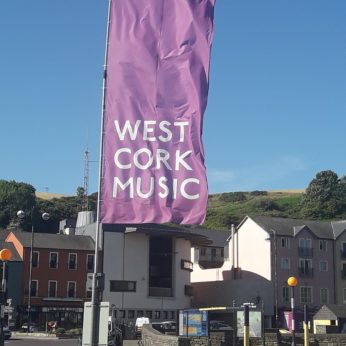Composer: Mieczyslaw Weinberg (b. 1919 - d. 1996)
Performance date: 05/07/2018
Venue: Bantry Library
Composition Year: 1944
Duration: 00:21:54
Recording Engineer: Tom Norton, RTÉ
Instrumentation: 2vn, va, vc, pf
Instrumentation Category:Duo
Artists:
Elina Vähäla -
[violin]
Yuri Serov -
[piano]

The
process of discovering Weinberg’s music has been a slow one. He was an
extraordinarily prolific composer writing seven operas, twenty-one symphonies,
seventeen string quartets, dozens of concertos and sonatas including six violin
sonatas and, like most Soviet composers, a host of film music. He always lived
in the shadow of Shostakovich, although an examination of their long friendship
makes it clear that musically Shostakovich owed as much to Weinberg as the
other way around. Humble to a fault, Weinberg lost all interest in performances
of a work once it was composed, simply moving on to his next creation. One is
reminded of Brahms’ relationship with Dvorak where the senior composer
recognised the genius of the younger one long before the rest of the world and
went out of his way to arrange a publisher and organise performances. The
difference being that Weinberg’s music has remained a hidden treasure for far
too long.
His
best-known work, The Passenger, which
dealt head-on with the Holocaust, was written in 1967 and only received its
stage premiere in 2010. The recent 2013 recording of his violin sonatas included
premiere recordings of the Second and Sixth Sonatas.
The
Second Sonata dates from the Spring of 1944, following on from the Third
Quartet that we heard earlier in the Festival, composed in the comparative
safety of Moscow although the German armies were still on Russian soil. The
anger from the Quartet has been put on one side and he opens the Sonata with an
exquisitely lyrical and gentle theme. The piano does try to increase the
temperature and eventually a new staccato theme does emerge to drive the movement
forward, though the mood soon calms to one of languorous self-absorption. The
movement closes with a series of questioning pizzicatos.
The
slow movement is a thing of wonder as the violin traces an ecstatically
beautiful theme above solemn chords from the piano. Weinberg has the gift of
melody as this work shows so delightedly. The Finale follows without a break,
appearing to dance away the night until the con
fuoco interlude bursts in. Although the dance returns the mood has changed
and the closing bars are explosive.
Copyright © 2025 West Cork Music. All rights reserved.
Designed and developed by Matrix Internet